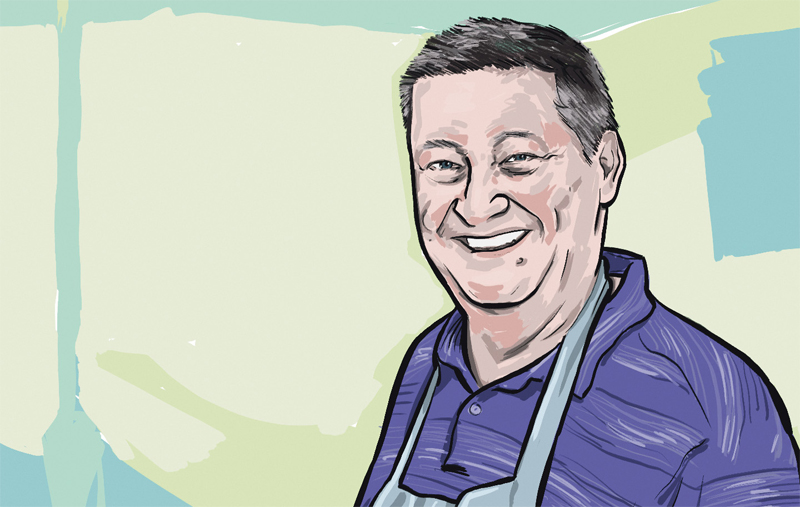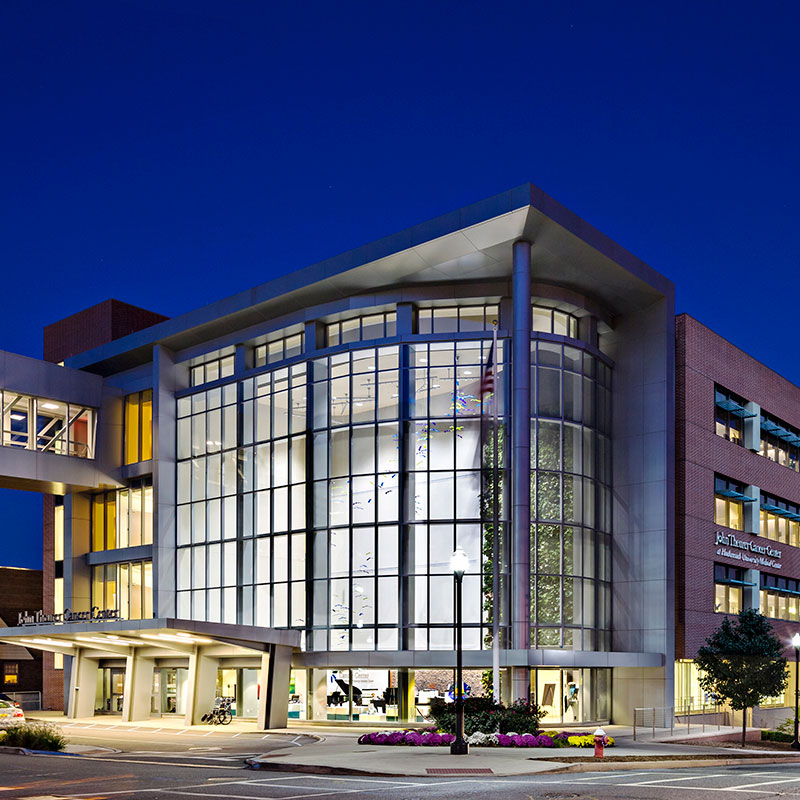Cancer-free After Clinical Trial

January 13, 2021
Typically, we photograph every patient appearing in HealthU. Because this story was planned during the surge of COVID-19, that contact would have been too risky. Instead, our team took a creative approach and replaced photo shoots with illustrated portraits of patients.
When Alain Fortier, 61, began experiencing skin rashes that came and went, he thought it might just be allergies. It was May 2012, and the plants, trees and flowers near his home in Freehold, New Jersey, were opening up for spring. But he also had tingling in his lips.
When he mentioned his symptoms to a nurse who worked with him at the Monmouth County Department of Health, she recommended he see his primary care doctor. That recommendation put him on a journey that eventually ended with him receiving an investigational therapy through a pioneering clinical trial at John Theurer Cancer Center at Hackensack University Medical Center, the results of which led to the U.S. Food and Drug Administration (FDA) approving a game-changing drug for a historically aggressive cancer.
A Formidable Foe
Alain had just had an annual physical as part of his job as a hazardous materials emergency responder, so he was surprised when his primary care doctor found a painless lump under his right arm. Imaging exams and a biopsy at a local hospital confirmed that he had aggressive mantle cell lymphoma, a type of non-Hodgkin lymphoma, which is a cancer of the immune system. His oncologist referred him to a nearby cancer center, where his diagnosis was confirmed, and he began receiving intensive combination chemotherapy.
After four cycles, he was ready for an autologous stem cell transplant, in which healthy stem cells were removed, multiplied in the laboratory and returned to Alain to start rebuilding his blood-forming and immune systems, which had been damaged by the chemotherapy. During this time, Superstorm Sandy came through and decimated New Jersey’s coast, and when Alain came home after three weeks in the hospital for the transplant, his house had no power. Still, he persevered and recovered.
Mantle cell lymphoma is a formidable foe, however, often coming back despite treatment. Whenever Alain’s cancer returned, he received more chemotherapy, more anticancer drugs and new cocktails of agents to knock the cancer back down. In 2017, his wife, Marie, who works in health care, read about an innovative treatment being assessed in a clinical trial at John Theurer Cancer Center. It involved a novel immunotherapy called CAR T-cell therapy.
New Option, New Hope
CAR T-cell therapy involves removing white blood cells called T cells from the patient, modifying them in a laboratory to train them to see a protein (CD19) on lymphoma cells and then multiplying them to much larger numbers. When given back to the patient intravenously, they expand further, identifying and killing cancer cells anywhere in the body.
Two other forms of CAR T-cell therapy were previously approved by the FDA to treat other types of cancer. But the new treatment was the first to be evaluated in people with mantle cell lymphoma.
Alain and Marie met with Andre Goy, M.D., M.S., chairman and director of John Theurer Cancer Center, who led the cancer center’s participation in the pioneering study, called ZUMA-2. “Dr. Goy told me that I was the ideal candidate for the study,” Alain recalls. “I had no choice. The treatments I had in the previous five years weren’t working. I wasn’t getting better, and I had a wife and two daughters to live for.”
After being removed from Alain’s body, some of his T cells made a round-trip journey to California. There, the maker of the promising treatment modified them to turn them into cancer-killing cells and sent them back to John Theurer Cancer Center, where Alain received them in June 2017. “This is like Star Wars stuff—science fiction—the way they can teach T cells to fight cancer cells,” Alain says.
In the first month, Alain experienced side effects, including weight loss, tiredness and weakness. But the treatment worked: About a month after the infusion, a scan showed a 30 percent reduction in the size of his lymph nodes. “I knew then that the killer T cells were doing their job,” Alain says. Two months later, there was no evidence of cancer in his body—a finding that has repeated itself every 90 days since.
Alain was not alone in his success. Sixty-seven percent of patients in the multicenter ZUMA-2 study achieved the same results: a complete response, meaning no evidence of disease. In addition, 40 percent of patients who initially had a partial response or stable disease (no reduction in cancer, but also no growth) went on to achieve a complete response within three to 12 months of the CAR T-cell infusion.
“These data support the effectiveness of a ‘living drug’ that continues to work over time,” Dr. Goy explains. The results have also been durable. After a median follow-up of 12.3 months, 57 percent of patients remained in remission. “This rate is totally unprecedented for this population of patients.”
Gratitude and Positivity
In July 2020, the FDA approved this CAR T-cell therapy for people with mantle cell lymphoma. “This FDA approval gives patients hope in the form of a new proven treatment in the arsenal of therapies for recurrent and persistent mantle cell lymphoma,” Dr. Goy says. “As providers of lymphoma care, we are ecstatic to be able to offer this game-changing treatment for patients in need.”
Alain went back to work within 30 days of hospital discharge after the CAR T-cell treatment. Today, in the age of COVID-19, he is careful to take the same precautions as others to minimize potential exposure to the virus, including wearing a mask, social distancing and good hand hygiene. He sometimes gets immunoglobulin infusions to boost his immunity and enjoys spending time with Marie and their daughters, Emily, 25, who lives in Indiana, and Jillian, 21, who is finishing college in South Carolina.
Each morning, he wakes up facing the day with a positive attitude, grateful for the time he has been given by this new treatment and for the personal, compassionate care he received from the John Theurer Cancer Center team. “I tell people to enjoy every day and be glad that you’re healthy,” Alain says. “Every day is a great day!”
Next Steps & Resources:
- Meet your source: Andre Goy, M.D., M.S.
- To make an appointment with Andre Goy, M.D., M.S. or another provider call 800-822-8905 or visit our website
The material provided through HealthU is intended to be used as general information only and should not replace the advice of your physician. Always consult your physician for individual care.
Find a doctor near me
What Happens When You Are Diagnosed with Cancer?

Facing a cancer diagnosis? Learn how a dedicated care team supports you through treatment and recovery. Find resources and hope. Call 800-822-8905.
Facing Cancer With a Positive Attitude

Facing Cancer? Find support and coping strategies to maintain a positive attitude during treatment. Learn from Dr. Abo and Dr. Lewis. Read now.
Find a doctor near me

Cancer Collaboration Brings Lifesaving John Theurer Cancer Center Clinical Trial to Washington, D.C., Native
Access leading-edge lymphoma treatment. John Theurer Cancer Center's clinical trial collaboration brings hope to D.C. patients like Salih Williams. Learn more.

Father and Son Overcome Colorectal Cancer Thanks to Timely Screenings
When Don Heddy turned 50 in December 2019, he knew there was one thing he needed to do: schedule a colonoscopy. Like anyone trying to stay on top of their health, he was faithful to that. But he didn’t expect the outcome.

A Fast Recovery from Lung Cancer Surgery
Fast Lung Cancer Surgery Recovery. Learn about minimally invasive options and a patient's positive experience. Call 800-822-8905.
Paterson Family Experiences Life in the NICU Not Once, But Twice
Paterson mom shares her NICU journey. Learn about her daughters' experiences & find support for premature babies. Call 800-822-8905.
